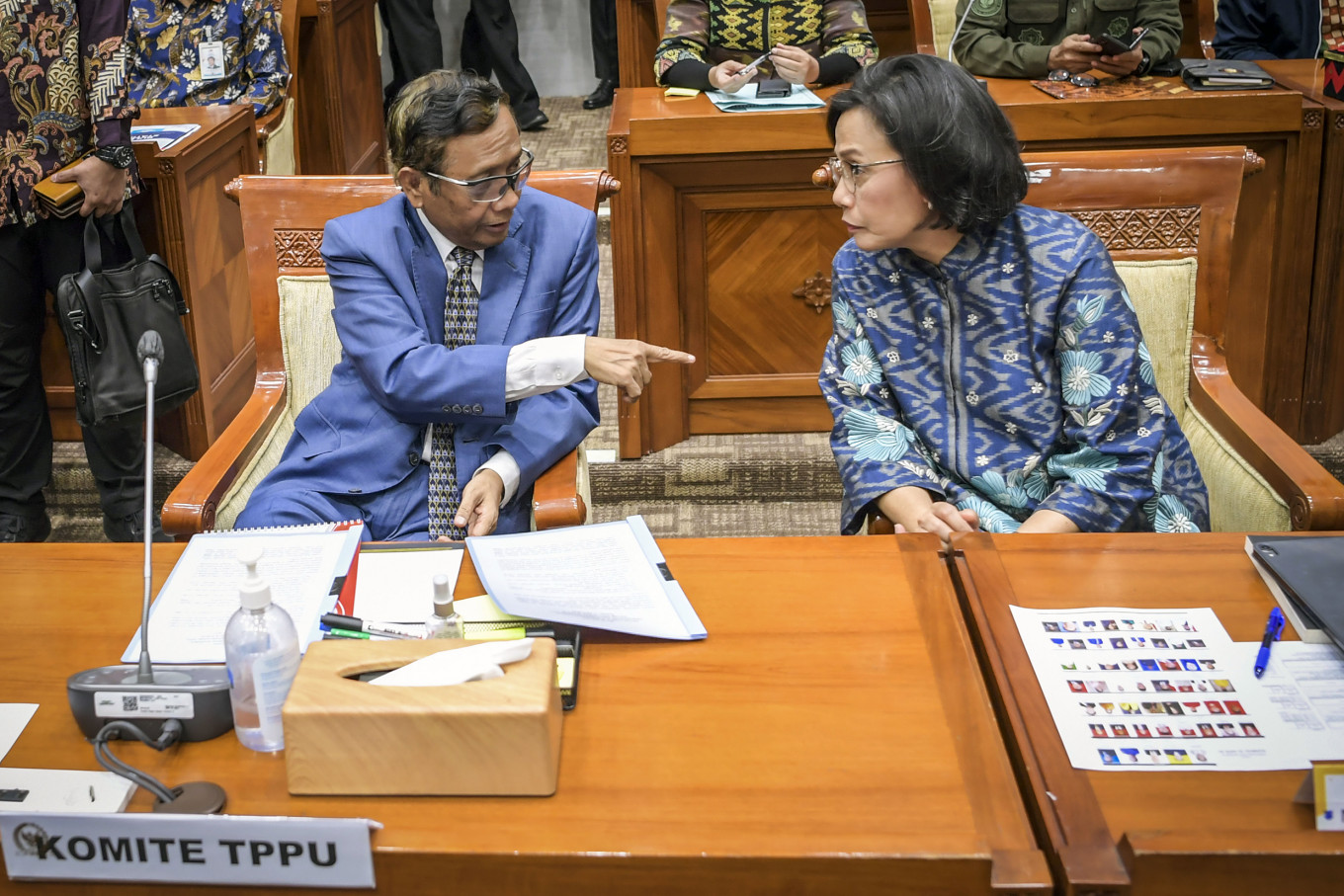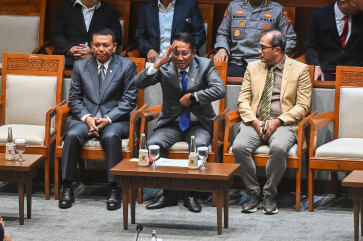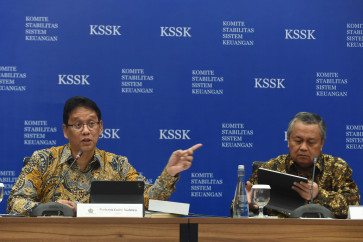Popular Reads
Top Results
Can't find what you're looking for?
View all search resultsPopular Reads
Top Results
Can't find what you're looking for?
View all search resultsWhat we can expect from Mahfud’s special task force
Money laundering is inherently complex as they are committed by white-collar workers, and it will be tough to build up cases if we still adopt conventional approaches.
Change text size
Gift Premium Articles
to Anyone
C
oordinating Political, Legal and Security Affairs Minister Mahfud MD has set up a special task force to further investigate the indications of money laundering involving Rp 349 trillion (US$23.2 billion) that were allegedly committed by officials within the Finance Ministry.
The road ahead for the task force would conceivably be steep and winding considering the challenges in building up anti-money laundering cases in Indonesia. Just to give an example, the Corruption Eradication Commission (KPK) being Indonesia’s forefront runner for corruption eradication is still facing challenges in building up a money laundering case against a former tax official due to the difficulty in discovering the predicate crime.
We may understand the problem given the KPK is authorized primarily to prosecute corruption cases. But another point of view would argue that the KPK should put emphasis on the assets instead of the predicate crime.
Money laundering is inherently complex as it is committed by white-collar workers, and it would be tough to build up cases if we still adopt conventional approaches. Therefore, the proper approach is to follow the money instead of the crime where the money originates from.
As a matter of fact, our anti-money laundering law has incorporated certain provisions to tackle this issue. To carry out investigations, prosecutions and examinations of money laundering crimes, law enforcers are not required to first prove the predicate crime. Another provision is on the reverse burden proof where the law requires the defendant instead of the prosecutor to prove that her assets do not originate from criminal offenses.
Lawmakers seem to have the understanding that proving the predicate crime would be challenging and thus grabbing it by the tail. If the defendant fails to prove the validity of her assets, it would be the entry point to uncover the predicate crime.
Despite the above, it appears that there is a mindset gap between what is being set out progressively in the law and how it is implemented in practice. The practice thus far seems to suggest that law enforcers are required to have indications of predicate crime to be able to prosecute. Money laundering might not be considered a stand-alone crime as it is arguably the continuation of the predicate crime. But the focus is not on finding the indication of the predicate crime. It should instead be on finding the suspicions in the assets of the alleged individuals, which thereafter would lead to the predicate crime.
The next challenge would be how to assess the profile of all the alleged individuals, whether the profile matches the assets owned or transactions made. To do so, Mahfud’s task force should have all the reliable information regarding the alleged individuals that it can get from anyone or any institution.
Note that in laundering the money, criminals would normally engage the services from financial institutions (e.g., banks, finance and insurance companies) and providers of other goods and/or services (e.g., property companies, jewelry and car dealers). Hence, the anti-money laundering law requires these companies to implement the “know your customer principle” and file reports on suspicious transactions to the Financial Transactions Report and Analysis Centre (PPATK). Particularly for financial institutions, on top of filing the report with the PPATK, they are obliged to submit reports on suspicious transactions to the Financial Services Authority (OJK) being the regulator and supervisor of financial institutions in Indonesia.
However, the reliability of the report might be questionable for practical reasons (i.e., as they are afraid of losing customers). The nuance might be different when it comes to financial institutions considering the OJK has issued a regulation on anti-money laundering programs. Unlike the providers of other goods and/or services, failing to comply with this OJK regulation would subject the relevant financial institutions to severe sanctions. Therefore, the task force should arguably be able to rely on the information provided by the OJK.
If the alleged individuals have exhausted the services of financial institutions in their schemes, then they would likely be subjected to the customer due diligence (CDD) process. The CDD is essentially an implementation of an anti-money laundering program required by the OJK, to be conducted by financial institutions over their potential customers. Before financial institutions can open accounts or facilitate transactions for their customers, they are required to do CDD. The CDD encompasses identification and verification of the customers, whether they in fact act for and behalf of themselves or somebody else (i.e., beneficial owner), their sources of funds, and objectives and purposes of the relevant transaction.
By having conducted the CDD, the financial institutions would be expected to identify the profile of the customers as well as detect whether there are any indications of criminal offenses (including the crimes of money laundering) being triggered because of the transaction. If the financial institutions have doubts about the information provided by potential customers during the due diligence exercise, they are under the obligation to refuse to do transactions with and for the potential customers concerned.
The Rp 349 trillion in suspicious financial transactions are not small and we suspect they would have involved banks and other financial institutions. With the OJK’s assistance, the task force should be able to dig deeper into the suspicious transactions to check the profile of all the alleged individuals. In addition, the suspicion can be the entry point to commence an investigation in checking whether the anti-money laundering program has been consistently implemented by banks and financial institutions involved in the transactions.
Perhaps it is easier said than done, but with the proper approach and with all the assistance that it can get including from the OJK, we should have the confidence that there will be light at the end of the tunnel for the task force to build up the anti-money laundering cases.
***
The writer is a partner at LHBM Law Firm. The views expressed are his own.










